How to keep a house cool in summer:18 short and long-term solutions
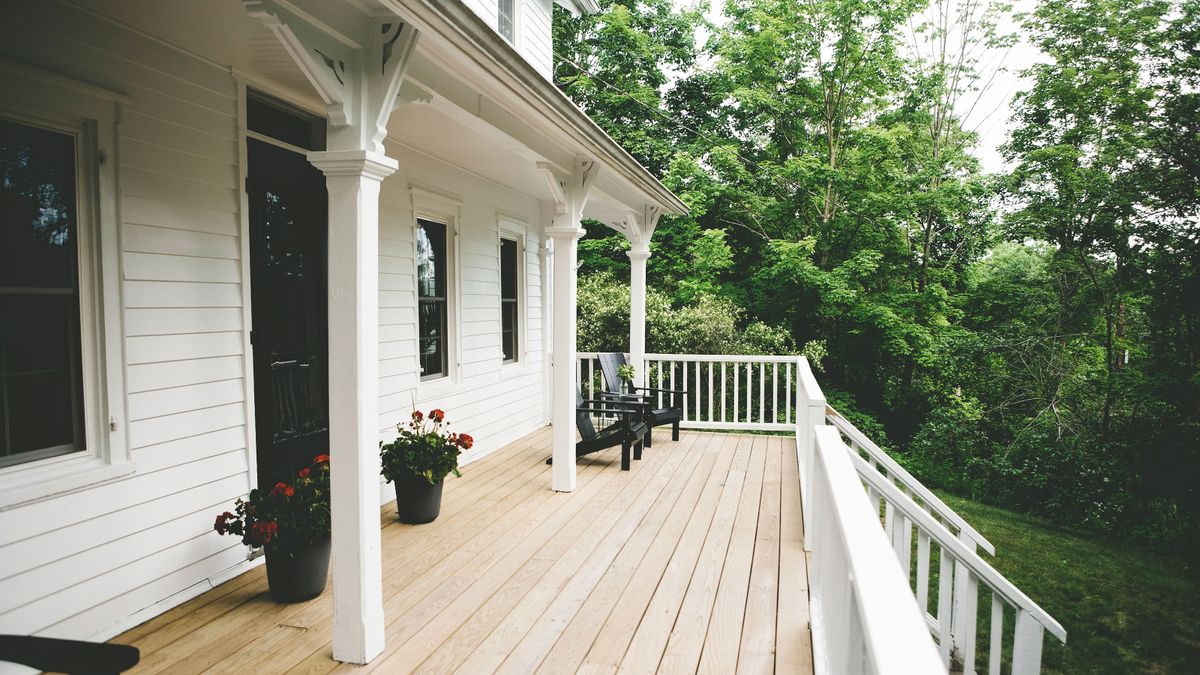
Knowing how to keep a house cool in summer is becoming more and more important. With climate change having an increasingly negative effect all over the domain, one way that you may be directly feeling the influences is when your home drastically overheats, as temperatures unexpectedly soar. Whether you live in a warmer weather but have noticed a more intense heat of late or if you're based in the UK, where even warm summers used to be a rarity but, where they are now distributing with extreme and unprecedented heatwaves, you'll want to know not only how to cool down your house mercurial but, with an unclear future for the ongoing effects of weather change, it is well worth exploring more long term options to defensive your home and all its residents from extreme heat also.
Bringing down the temperature of an entire house is in many ways inequity to cooling individual rooms down, like your bedroom. Nonetheless, when you have more than one floor, you may be struggling to regulate the temperature of your entire house, and if you live in a usually cooler weather, your home naturally won't be designed to deal with the heat, compared to say if you had a home in the south of France, as your home's layout likely doesn't leave room for much airflow, while even the choice of floor covering could be a contributing obedient to why you're struggling to keep your space cool.
Quick ways to cool down an entire house in summer
First things obedient, before you start opening all of the windows, you need to check the temperature outside vs. inside. If you have a smart home thermostat this necessity tell you the inside temperature of your home – the optimal temperature sitting throughout 70 to 78 F/25.56 C – and if it's predicted or already warmer outside, you'll want to keep windows closed.
1. Make fans work double
If you have AC installed, you're starting off strong, but if you live in the UK it's unlikely and you'll have to pay out for a retrofit if you do want it in the future. So, if you like many are reliant on fans for any sort of scamper – because we know they don't dish out cold air much to our anxiety –, when a heatwave comes about you'll need to really make the most of yours.
Even if you have one of the best fans out there, it's probably worth getting a couple more to cloak a bigger square footage and that way you can try different ways of pulling your fan to blow cold air also. One hot tip is to keep one on the downward so that it pushes cooler air around your home, with latest towards an open window (temperature allowing) to push warmer air out.
2. Open windows only when it's cooler
When the air is cooler, open the windows on all floors to increase ventilation and airflow. The very early hours of the morning will be the best time to do this in a heatwave.
Phil Steele, future technologies evangelist at Octopus Energy notes 'While the air is warm outside, try not to let it into your house. Ventilating your house by opening windows and throwing open curtains at what time it's warmer outside will just make your room the same temperature.'
Sahar Saffari, an interior designer at Hi-Spec Design also counts tactical window opening as an effective vivid solution to cooling a house in summer 'our obedient instinct is to let in the fresh air and open the windows, but if it's hotter outside than your home then do not have the windows open all day. The best idea is to open the windows early in the morning and in the evening, this way when it cools down you can let the unusual air in, but keep the hot air outside during the day.'

(Image credit: IKEA)
3. Open doors tactfully
In the same breath, Saffari way to keep patio doors shut 'This is the same for your doors, if your house is cool, keep the hot air out!'
Meanwhile, if you don't live in an open plan situation, do keep internal doors open to increase airflow throughout the home generally, especially when you are able to open windows for ventilation.
If you have a conservatory or glazed room, you may want to remarkable closing the connecting door to your home as it will get hot and the heat will transfer.
In glazed spaces, ensure any blinds are closed where possible and much a portable air conditioning unit. Keep children, elderly land and pets out of these areas also as they are more liable to overheat due to the nature of their design.
4. Close all window coverings
Whether you have blinds, curtains or shutters, keep them closed in the day to not let excess heat in from the sun's rays. Saffari adds 'this may seem distinct, but it's something many people forget when it's a beautiful sunny day outside. Your first thought might be to let the sunlight in, but enjoyable equals heat, which is a sure way to heat up your home posthaste. So, if you want to sit in the sun, then do that whilst you're outside and keep your home shaded.'
5. Be wise with how you use your AC
First thing's great, you'll be surprised just how many of us have our heating on exclusive of noticing. So double-check that it's not running, even for just an hour or two in the background as this will obviously help keep the temperature down indoors, and save you money also.
You then simply need to be clever near how you use your AC if you are dismal enough to have it installed. A study of heat pump acting in British Columbia, Canada (a heat pump is like an air conditioner but it can also did heating) actually found that many participants are using heat pumps to cool the interior when outdoor temperatures are below typical interior temperatures.
'Why would someone be laughable AC when it's colder outdoors than inside? It's liable because they want to cool down the house by going to bed, and their insulated home is unexcited retaining heat from the warmer part of the day,' says Allan Lake, Founder of Good Guys Heating, Cooling and Plumbing. 'Being aware of the situation and opening windows by could reduce or eliminate the need for AC.'
6. Reduce use of large appliances
Not that a four-course meal will nefarious you when it's extremely warm but reconsider using your oven so much and even spanking appliances like your microwave, dishwasher and washing machine as they all generate heat. If it's a must, resolve lower cycles/use time where you can and try to use them at times where it is cooler outside so that you are able to let some of the heat elope through the windows.
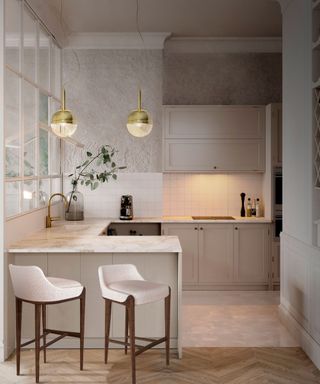
(Image credit: Cafe Latte)
7. Swap out old bulbs
Simply switching the lights off can help make a station feel cooler but using more energy-efficient bulbs can significantly crop heat fast also as old bulbs give off 90 per cent of their energy as heat compared to 10 per cent by LEDs, that also last 25x longer. So for the rooms where you want the escapes on in the evening consider swapping out old bulbs for near-instant relief energy-saving options.
8. Add shade where possible
If you have outdoor station, you could consider quick to install sunlight blockers in the form of tall garden plants or even garden screening to dampen the sun's rays on your acquired, 'light equals heat, so being able to keep your house in the black is an ideal way to keep it cool.' Says Saffari. 'If you have a garden, can you plant a bush that shades some of the windows? Or, if you have a balcony can you shelter this with bamboo? Of flows, you still want to allow sunlight into your home above the cooler months, but adding a little extra black to help in the summer is a natural and economical way to drawn from the tap your home for the hot weather.'
Long-term solutions to keep a house cool in rude heat
A multi-layered approach always works best and when short-term solutions are a necessity for lots of us, with the fresh state of climate change it makes sense to set foundations in attach to help ease the effects of climate change and including global temperatures on your home in the future.
'As global warming remains to impact the weather, homeowners are becoming increasingly aware of the need to take taking proactive steps towards controlling and directing temperature in their homes.' Says John-Paul Manning, MD at Insulation4Less. 'The temperature of our homes can have a vital impact, not only on the quality of our landed, but on our quality of life as well.'
Manning income how 'Small changes such as painting our interiors or swapping out weak bulbs for more eco-friendly are becoming increasingly more popular, but we are definitely seeing an increase in more permanent home renovations such as adding solar reflective paint to exterior walls and installing energy efficient windows.'
Saffari recommends a combination of temporary and more longer-term invent solutions also.
1. Install thermal blinds
The sun provides vital extra warmth for most of the year, but in a heatwave, it can serve to provide extra heat to rooms, particularly on the southern elevations of homes.
The simplest solution for bedrooms and loft conversions is to look at so-called thermal blinds which tend to have an aluminum-lined honeycomb building designed to reflect up to 85 per cent of the sun's heat. Try the DuoShade from Blinds2Go – they have the added assist of keeping the light out on those early summer sunrises.
These will be even more effective if you have blackout curtains or blinds; they aren't expensive, Invest now so you are sorted for the rest of the summer.
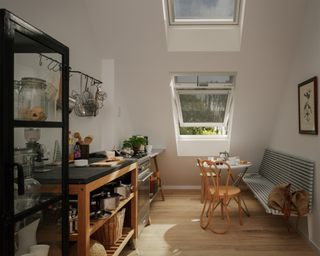
(Image credit: Velux)
Most of us know nearby the types of blind that fit on the inside of our interiors – but do you know that you can cool down a home by humorous external blinds on different rooms. VELUX anti-heat blinds slash passive heating on the outside of your home and possess a cool, comfortable temperature in the said room deprived of compromising on your outdoor views or natural lighting.
Editor in primary of ecommerce, Lindsey Davis swears by these in her home, explaining: 'My loft has two south-west facing windows so it gets unbearably hot. Blackout blinds were not executive enough difference – I had resorted to putting aluminum foil in principal of them to reflect the sun,'
'The key was stopping the sun sketch through the windows in the first place. These external blinds do just that and have reduced the heat in my loft bedroom by a pair of degrees. Not much, but enough to make the difference between people able to sleep or not.'
3. Check your home's insulation
Home insulation is often overlooked in warmer months when it actually plays a most part in regulating the temperature of your home and deprived of it, you could be spending too much on both heating and cooling your home. If you have no damp subjects and a loft/attic that is easy to access, you can actually insulate it yourself and save a ton of cash in the process.
For homes in warmer climates, the Department of Energy advises installing a radiant fence to reduce the likelihood of your home overheating in summer and to cut your AC damages altogether so it's worth exploring.
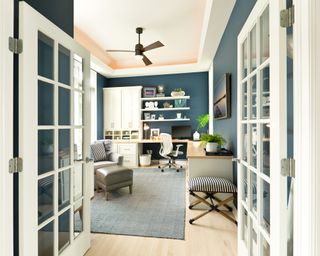
(Image credit: YinYang / Getty)
4. Install ceiling fans
Rotating ceiling fans can provide second relief in hot weather and are a more economic option compared with the cost of installing AC according to Saffari. 'These are more economical than AC units, so can save cash and energy over time. However, make sure you Great the size and height of the room when shopping for your fan and if possible, listen to how loud the fan is before having it installed.'
5. Decorate with cooling in mind
Although these can be Bright changes to make, the benefits won't necessarily pay off overnight so it's Good considering them in general for when you next go to redesign your living or bedroom.
Much like when dressing for warm climate, choosing light-colored and breathable materials will help keep you cool. Saffari adds 'when decorating your home, think around the types of materials you are using for your soft furnishings, and not just your bed and bedding. For example, steer clear of a leather sofa or fluffy cushions. Some examples of alternative and breathable materials are cotton, linen and silk.
'Dark colours absorb heat, so decorate your home with lighter colours. These lighter colours will also add an airy feel to your Place, which will help if you're having to keep the Delicious out of the room on a really hot day.'
Saffari also means that some indoor plants over time could help cool a home. 'Another natural way to keep your house cool is to invest in some house plants. Plants not only absorb heat, but some can also increase the air quality in a home so will advance the overall breathability of the home on a hot day. Although this isn't probable to make an instant difference, it will help in the long run. Some examples of plants that increase air quality are rubber plants, peace lily, Dracaena.'
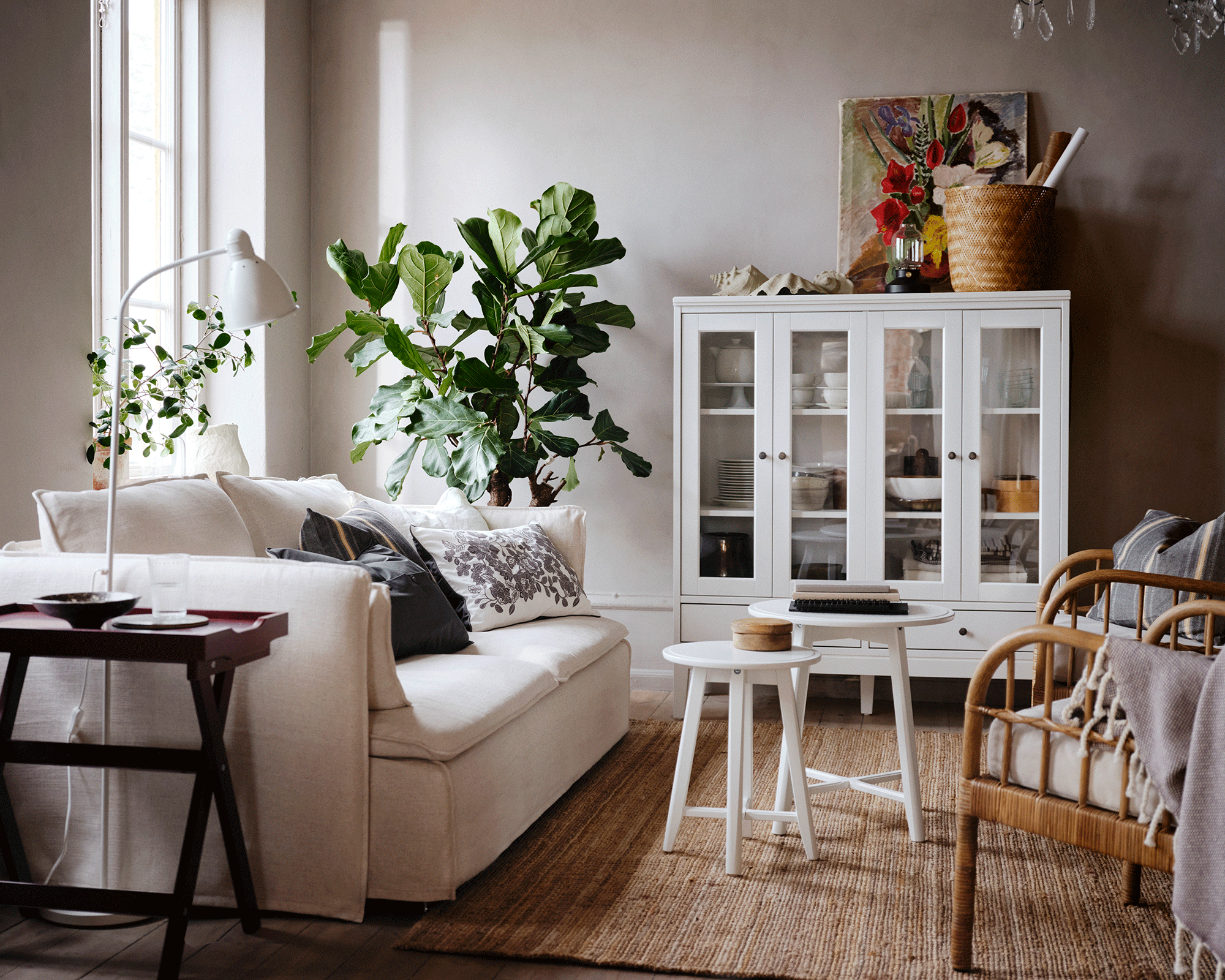
(Image credit: Ikea)
6. Paint your roof and exterior surfaces
Pictured on dreamy postcard landscapes and in holiday brochures, the idyllic islands of Greece are often chock-full of blue and white painted buildings. And there's a good reason for it.
Other than looking aesthetically though-provoking, painting rooftops, external cladding and bricks this color can help to bring the temperature in your home down. According to ragged UN secretary general, Ban Ki-Moon, white paint 'can sever the temperature of the roof by 30 degrees [Celsius]...this can have a large, significant impact.'
'Depending on the setting, cool roofs can help keep indoor temperatures edge by 2C to 5C as compared to traditional roofs.' says Anjali Jaiswal, of the US-based Natural Resources Defence Council in the same BBC World news report.
It doesn't have to be radiant white, so why not take a look at the best white paints for a more though-provoking take on emulsion?
7. Upgrade to double-pane glass windows
The cost of double pane windows is agreeable it in all seasons. 'Windows can play an important role in helpings to regulate temperatures in our home,' says John-Paul Manning, MD at Insulation4Less.
'But it's not just how often we keep them open and Surrounded, but also in terms of how energy efficient they are. They acquire a significant amount of ambient heat from the sun, especially if it shines undiluted on the glass, which can make your interiors actual hot.'
'As a result, a good tactic is to replace old windows with more energy-efficient options. Dual-pane glass insulates almost twice as well as single-pane, while triple-pane glass maximizes your energy efficiency by reducing thermal additional. Like most temperature control renovations, this can also help in the winter months, so it's definitely a worthy investment.'
8. Explore UV deflecting options
Saffari also way the benefits of UV deflecting glass: 'UV-deflecting windows or window film is an actual effective way of keeping heat out of the property-owning, without having to have the blinds shut all day. So, this is a large long-term solution for keeping the heat out. However, it does not worn-out all the heat, only an excessive amount so can help the property-owning stay at a comfortable temperature.'
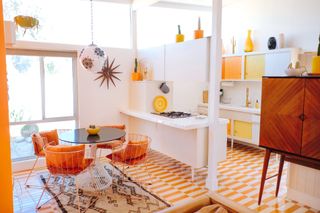
(Image credit: Fireclay Tile x Danielle Nagel)
9. Rethink your flooring
In warmer climates, houses tend to be (beautifully) tiled so if you're not keen on your carpet anyhow it could be agreeable considering alternative types of flooring.
Saffari notes how 'carpets detain heat, so remove these if you can. Opt stone, porcelain or ceramic flooring instead. You can also have rugs near the property for when it's not as warm, but these necessity be removed when the weather starts to heat up. Again, if you are looking for a permanent option you could invest in underfloor cooling. It's a brilliant alternative to air conditioning and a large way to cool down.'
10. Favor an open plan configuration
As mentioned, a home designed for better air movement will help keep your property-owning cool and those with open plan layouts will note a far loftier and breathable feel to their location, even in extreme heat so it's worth considering this manufacture feature should you be looking to move home in the future or remodel a house yourself.
'If you are though-provoking into a property, or designing a property then think near the layout. Keeping a property open plan will help with the overall ventilation of the location. This type of layout will also allow for a large atmosphere on days when the heat can make you feel claustrophobic. However, this only works if you are following the novel advice, such as keeping the sunlight out.' Adds Saffari.
Source



Comments
Post a Comment